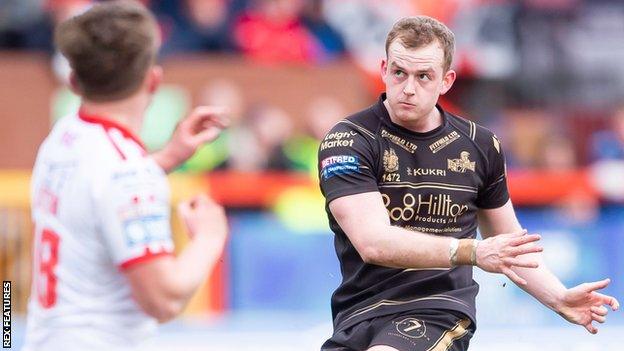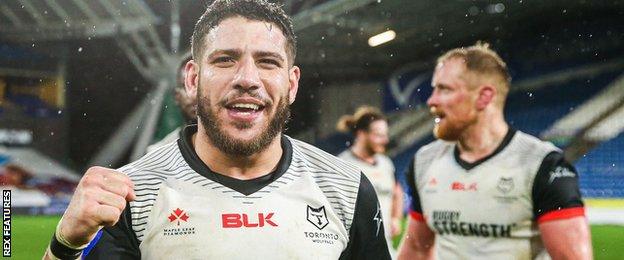Super League: RFL considers promotion and relegation conundrum
- Published

Leigh Centurions (right) were one of three Championship teams with 100% records when the season was suspended
The Rugby Football League says no decision has yet been taken on whether to rule out promotion and relegation this year.
But common sense would surely suggest that there cannot be any movement between Super League, Championship and League One in a season of such disruption.
With only a handful of games played pre-lockdown, and the likelihood that, at best, any return to action would be behind closed doors, and with Catalans and Toronto denied any home games, there is a general acceptance that it simply wouldn't be fair to relegate anyone from the top flight.
Super League chief executive Robert Elstone has gone on record this week, on behalf of the top clubs, saying that relegation would "not be fair and equitable".
He added: "Against that same backdrop, it would feel unreasonable and unfair to promote a team into Super League."
But it is not in the gift of Super League clubs to decide on the mechanics of promotion and relegation - that is a decision for the Rugby Football League to take.
And a spokesman told the BBC: "The RFL board have been discussing for some time the implications of the season suspension, which include the impact on promotion and relegation between the Super League, Championship and League One competitions.
"These are board decisions, to be taken in the best interests of the sport."

Toronto Wolfpack are bottom of Super League but still in the Challenge Cup
But there is a growing sense that this year no-one can go up, and no-one can go down.
That's an incredibly tough reality for a handful of Championship clubs to accept - to rule that they can't have a crack at making it into the top flight having invested heavily to achieve that prize.
They are saddled with wage bills that reflect those aspirations, and that financial commitment could now weigh heavily if the prize was denied them.
Down in League One, Newcastle also have every right to feel frustrated, having just missed promotion last year, and now almost certain to do so again because of the ramifications of this health crisis.
There have been suggestions that, to get round this, Super League could be expanded to 13 or even 14 clubs, a proposal backed by Bradford coach John Kear.
But even if the RFL and the Super League clubs agreed to an expansion of the top flight, there's still a question of how it is decided who goes up.
Super League has every intention of getting cracking with matches behind closed doors as soon as they are allowed, in order to guarantee television contract payments from Sky, with the next cheque due in July.
There is no similar incentive for most of the Championship and League One clubs to do likewise. Playing behind closed doors doesn't offer any financial rewards for them, in fact quite the opposite.
They would have to take players out of furlough and begin paying them again, and they wouldn't be getting any income. That would almost certainly put several clubs out of business.
The likelihood is, as discussions continue about how the rest of 2020 pans out, that the lower leagues will simply be shelved. That would be the overwhelming desire of the majority of those clubs, even though it would leave a handful exasperated.
Clubs such as Leigh, London, Featherstone, and maybe Toulouse, might seek to set up a mini-competition behind closed doors. It would be a type of play-off among the ambitious clubs to see who should go up, but there would be massive risks involved with that.
The clubs in that scenario would be left with even bigger debts if the gamble backfired. And there is no strong indication that the RFL and Super League would agree to an expanded top flight and a dilution of what TV money may be available next year.
Meanwhile, no decision has been taken yet regarding this year's Challenge Cup.
The final remains in the diary for 19 July at Wembley Stadium. But only the wildest optimist, with no understanding of the current situation, can see that happening.
Watch as League one Newcastle defeat Dewsbury 38-30
Instead, the cup will be pushed back with a determination that it should happen this year, even if it is at a later date and even if another venue hosts the final should Wembley not be available.
There'll have to be some serious scratching of heads about how the competition is played out if the five lower-league clubs left in the draw pull out because their league seasons have been scrapped.
The other 11 teams remaining are all Super League sides, but that includes 2018 winners Catalans - who may not be able to travel - and doesn't include Huddersfield, who have already been knocked out.
It's going to take some unpicking if the cup is to be played to a conclusion this year with its integrity intact.
